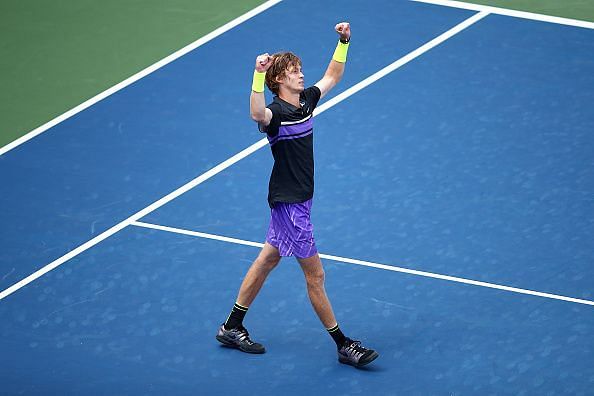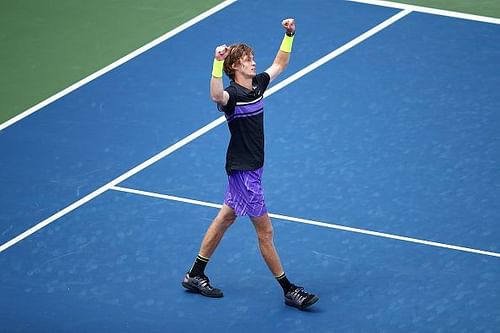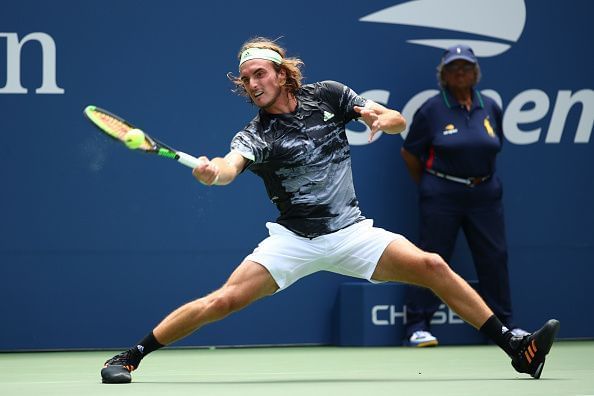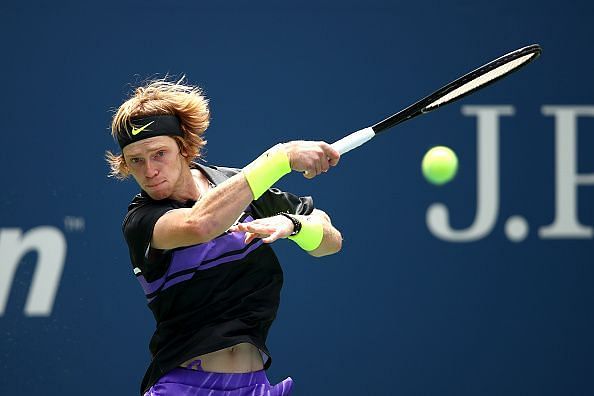
US Open 2019: Tsitsipas showed heart, but it wasn't enough to hold off Rublev's consistent power

What’s harder than playing a supremely talented opponent? Playing a supremely talented opponent who’s hurting, as Andrey Rublev found out yesterday.
The first of two high-profile Next Gen battles on Day 2 of the US Open, the match between Rublev and Stefanos Tsitsipas ended as something that wasn’t exactly a farce, but wasn’t anything less than a high-pitched melodrama either. Tsitsipas could barely walk, Rublev could barely keep the ball in the court, and the crowd could barely keep their emotions in check. Eventually, the serve was the difference-maker; Tsitsipas’ serve speed dropped below 100 mph and Rublev got just enough first serves in, and those few cheap points proved decisive.
But before that high-wire finish, the match was as absorbing and awe-inspiring as anything we’ve seen from the Next Gen so far. While Tsitsipas made a few errors early on to give Rublev the advantage, from about the middle of the first set there was very little to separate the two players. The shot-making on display was of the highest quality, making you wonder why the match wasn’t scheduled for prime time on Arthur Ashe instead of early morning on Louis Armstrong.
Rublev has had a summer of success, having finally shaken off his post-injury doldrums to register a few big wins. Tsitsipas has been on the exact opposite path, failing to recover in time from his heartbreaking Roland Garros loss to Stan Wawrinka and making early exits pretty much everywhere. This first-round match was significant for both players, and that showed in how hard they fought for each point.
Rublev’s forehand was the biggest shot on the court, but overall it was Tsitsipas who had the superior all-round weapons. He served better, volleyed more often, and turned defense into offense more effectively. Unfortunately for the Greek though, he was also more likely to cough up an error at an untimely moment.
Rublev went a set and a break up by merely playing the big points better, and at that stage it seemed like his consistency off the ground would be too tough to pierce through for the unstable Tsitsipas. But Rublev choked the break away (not for the last time in the match), and that was Tsitsipas’ cue to unshackle himself and bring out his best tennis.
The end of the second set saw Tsitsipas playing completely out of his comfort zone – and making it work. He started taking huge cuts on practically every shot, pushing Rublev back with the force of his groundstrokes and putting away weak replies at the net. The Rublev forehand was stripped of its advantage as Tsitsipas started crushing his own forehand into the corners, and the match seemed to have taken a massive shift in direction.

The third set was possibly the highest quality period of play that we’ve seen on the first two days of the Open. Tsitsipas was flying, but Rublev wasn’t backing away. The Russian took advantage of every small opening to eke out another break at 3-2, before Tsitsipas struck back immediately to get back on level terms.
The set went with serve the rest of the way, and the tiebreak was more of the same. Neither player seemed willing to yield an inch; set points came and went, but the two still seemed joined at the hip.
Tsitsipas was again the more proactive player, but also the more erroneous one. Rublev on his part returned serve brilliantly, and used his strong anticipation skills to make the Greek hit a few extra shots.
He was on to something. At 7-7 Tsitsipas bullied Rublev all over the court, but was made to hit one additional volley – which he missed. That proved to be a fatal error, as Rublev served it out to gain a stranglehold over the match.
The two had already spent over three hours on the court by the time the fourth set started, and surprisingly it was the ultra-fit Tsitsipas who showed the effects of that first. Struck by a bout of cramps mid-way through the set, the World No. 8 started moving around like a zombie and repeatedly pulling his leg up in agony. And yet Rublev was in no mood for sympathy; he complained to the chair umpire that Tsitsipas was taking too much time between points, and demanded to know why he wasn’t given a time violation.
This was a proper street brawl, and both players seemed happy to give each other bloody noses. Rublev would’ve probably finished the match quicker if he had remained calm in the face of Tsitsipas’ struggles, but he let the opponent and the situation get to his head. After pulling off a series of impossible shots in the first three sets, he started making a mess of routine ones in the fourth. And Tsitsipas, despite having no energy in his legs and no capacity to serve, hit out like a madman to take the match as far as he possibly could.
Eventually the umpire did give Tsitsipas a time violation, but the Greek kept fighting. Rublev served for the match at 5-4 but got broken; he served for the match again at 6-5, and looked likely to self-combust out of pressure.
Fortunately for him though, Tsitsipas’ body had finally thrown in the towel. The Greek couldn’t get enough balls back in play in that last game, and Rublev managed to wrap up a remarkable win – almost as remarkable as anything he did during that famous quarterfinal run at the 2017 US Open.

Back then Rublev was a fresh-faced teenager who had nothing to lose, and his forehand alone was enough to hit through a series of higher-ranked opponents. But now he is older and battle-scarred, and in that dramatic fourth set he had to learn the hard way that sometimes tennis is about more than just forehands and backhands.
“It was tough conditions and we played an amazing match,” Rublev said later. “I know how it is. I was cramping many times during the match too. This is five sets that we’re working for. When you win matches like this, it gives you confidence. This match is special, because you know how great he is.”
That sounds like the statement of a man who has taken a big step forward in his evolution, and by all accounts this win does seem like one for Rublev. He may not be ready yet to start winning Slams, but with each passing month he is adding a new wrinkle to his game and mindset.
The reverse seems to be true for Tsitsipas, if you look merely at his results – he seems to be suffering a new kind of heartbreak at each new tournament. But I’d be willing to wager that this latest loss won’t be too big a setback for him. The way he took the attack to Rublev mid-way through the match, and the way he fought on at the end, suggest that his mind is back where it needs to be.
Tsitsipas hit 65 winners in the match, and overpowered Rublev for vast stretches of it. Clearly, his game is not lacking in intensity anymore.
The painful end was more about the physical than the mental for Tsitsipas, and that’s something that can easily be solved with a bit of rest. The important take-away is that the Wawrinka loss didn’t rob Tsitsipas of his heart; he still has what it takes to compete at the highest level.
Even if he can only stand on one leg.